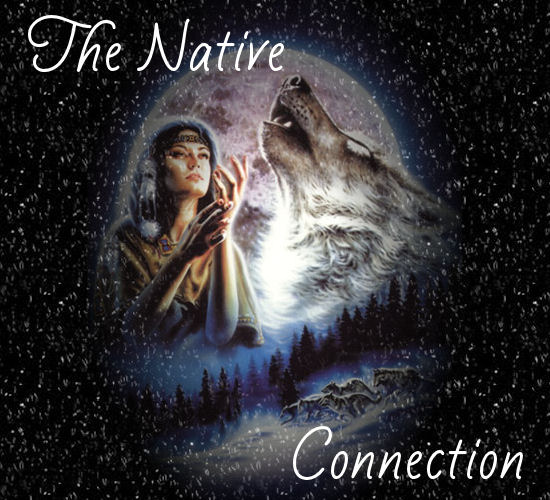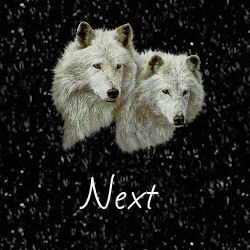|
|

An old Cherokee is telling his grandson about a fight that is going on inside of himself.
He said it is between two wolves.
One is evil, envy, sorrow, regret, greed, arrogance, self-pity, guilt, resentment, inferiority, lies, false pride, superiority and ego.
The other is good, joy, peace, love, hope, serenity, humility, kindness, benevolence, empathy, generosity, truth, compassion and faith.

The grandson thought about it for a minute and then asked his grandfather, "Which wolf wins?"
The old Cherokee simply replied, "The one I feed."

THE TEN INDIAN COMMANDMENTS
Treat the Earth and all that dwell thereon with respect
Remain close to the Great Spirit
Show great respect for your fellow beings
Work together for the benefit of all mankind
Give assistance and kindness wherever needed
Do what you know to be right
Look after the well-being of mind and body
Dedicate a share of your efforts to the greater good
Be truthful and honest at all times
Take full responsiblity for your actions
Waya (Wolf) - Waya can help you to learn about compassion and loyalty to your family, your friends and your children.
From Wolf, you may learn to be forgiving, trustful, intimate, and loving.
You can learn about community, selflessness, generosity, and to trust your insights.

Wolves have been long regarded by Native Americans as teachers or pathfinders.
Wolves are fiercely loyal to their mates, and have a strong sense of family while maintaining individualism.
In the stars, Wolf is represented by the Dog, Sirius, thought by many aboriginal tribes to be the home of the Ancients. Wolves are probably the most misunderstood of wild animals.
Tales of cold-bloodedness abound, in spite of their friendly, social and intelligent traits.
They are truly free spirits, even though their packs are highly organized.
They seem to go out of their way to avoid a fight.
One is rarely necessary when a shift in posture, a growl, or a glance gets the point across quite readily.

Traditionally, someone with Wolf Medicine has a strong sense of self, and communicates well through subtle changes in voice inflection and body movements.
They often find new solutions to problems while providing stability and support that one normally associates with a family structure.

Wolf's medicine includes facing the end of one's cycle with dignity and courage,
death and rebirth,
Spirit teaching,
guidance in dreams and meditations,
instinct linked with intelligence,
social and family values,
outwitting enemies,
ability to pass unseen,
steadfastness,
skill in protection of self and family,
taking advantage of change.

In the Native American way, the word medicine means anything that brings one closer to nature and the life force inherent within all living things.
This could mean the healing of the body, the mind, and spirit, as observed through the lessons and living patterns of the animal kingdom.
Of course, this requires astute awareness by the seeker and the desire to be in harmony with the strength and wisdom of that creature's essence.
Native American medicine is a "way of life".

Animals are powerful teachers that frequently appear in our dreams or our daily activities, providing us with insight, companionship, and subtle messages. Understanding these signals necessitates humility and the ability to be in touch with one's intuitiveness.

A dynamic animal of the great kingdom of creatures is the wolf. Referred to as the teacher and pathfinder of new ideas; the wolf has an enormous sense of family, as well as a strong individualistic drive.
These traits would seem to to make the wolf quite similar to the human race.
In the terrific guide book accompanying Medicine Cards (Bear & Co.), authors Jamie Sams and David Carson describe wolf medicine as "empowering the teacher within us all to come forth and aid the children of Earth in understanding the Great Mystery and life.
As you feel wolf coming alive within you, you may wish to share your knowledge by writing or lecturing on information that will help others better understand their uniqueness or path of life"

Native American tribes recognized the wolf for its extreme devotion to its family, and many drew parallels between wolf pack members and the members of the tribe.
Also, the wolf's superior and cooperative hunting skills made it the envy of many tribes.
Finally, the wolf was known to defend its home against outsiders, a task with which each tribe had to contend as well.

Some examples of the wolf appearing throughout Native American religion and mythology include the following.

The Eskimos told of an old woman, Qisaruatsiaq, who was abandoned and forced to live by herself, and who eventually turned into a wolf.

The Sioux called the wolf "shunk manitu tanka," or "animal that looks like a dog but is a powerful spirit."

Cheyenne medicine men rubbed warrior arrows against wolf fur to bring better success in hunting.

The Nootka celebrated spiritual ties to the wolf, in a ceremony whereby they pretended to bring back to life the chief's dead son, by wearing wolf clothing.

The Cherokee would not kill a wolf, believing the dead wolf's siblings would enact revenge. They also imitated the wolf's walk to help ward off frostbite to their feet.

The Crow dressed in wolf skins to hunt.

The Mandan displayed on their moccasins wolf tails, signs of success in battle.

Women of the Hidatsa tribe rubbed their bellies with wolf skin to alleviate difficult childbirth.

The Cree believed divine wolves visited earth when the northern lights would shine during winter.

The Ahtena would prop dead wolves up, sometimes feeding them ceremonial meals.

Chippewa myths tell of wolves supplying humans with food and hides.

The Delaware tribe thought a change in weather might be announced through a wolf's howl.

The Hopis include Wolf as one of the Katchinas, the costumed dancers who represent the powers of the universe.

Indian creation mythology sometimes involves wolves, as in this example from the heritage of the Arikara tribe:
"In the beginning, they say, was water and sky.
Here on high you could find Nesaru the sky spirit, and Wolf and Lucky-man.
Below lay a watery vastness, empty, it seemed, with only two small ducks swimming about, making eternal, small ripples.
Envisioning another kind of earth, with space and variety for myriad creatures, Wolf and Lucky-man asked the ducks to dive down for mud.
Using his endless energy, Wolf took half of the mud to build a great prairie for hunting beasts like himself. Lucky-man, his partner in creation, built hills and valleys where the Indians could hunt and live. Last they pushed up the remaining mud into banks of a river, which you can still see, to divide their territories.

Earth was ready.
Wolf and Lucky-man understood that large creatures must emerge from the reproduction of smaller, humble ones.
They enter deep into the earth to find two Spiders who are meant to begin propagating the world.
Imagine their disgust when they find the Spiders to be not only ignorant of the business of reproduction, but so dirty and ugly that they aren't interested in each other.
Wolf and Lucky-man scrub down their charges and explain the pleasures and responsibilities of fertilization. Clean and enlightened, the Spiders give birth to earth's many creatures - the eight-legged like themselves, the six, the four, and finally the two-legged ones."

Perhaps the tribe with the closest of all associations with the wolf is the Pawnee, in the lands now known as Nebraska and Kansas.
The Pawnee felt such a close kinship that their hand-signal for wolf is the same as the hand-signal for Pawnee.
They were known as the Wolf People even by neighboring tribes.
The cyclical appearance and disappearance of Sirius, the Wolf Star, indicated the wolf coming and going from the spirit world, running down the trail of the Wolf Road, otherwise known as the Milky Way.

The Blackfoot tribe also called our galaxy the Wolf Trail, or the Route to Heaven.

The Pawnee, like the Hidatsa and Oto tribes, used wolf bundles, pouches of skins from wolves in which to keep and protect treasured implements used for ceremonies and magic.
 
Webset by
Angel
| |
|
|
|
|
|